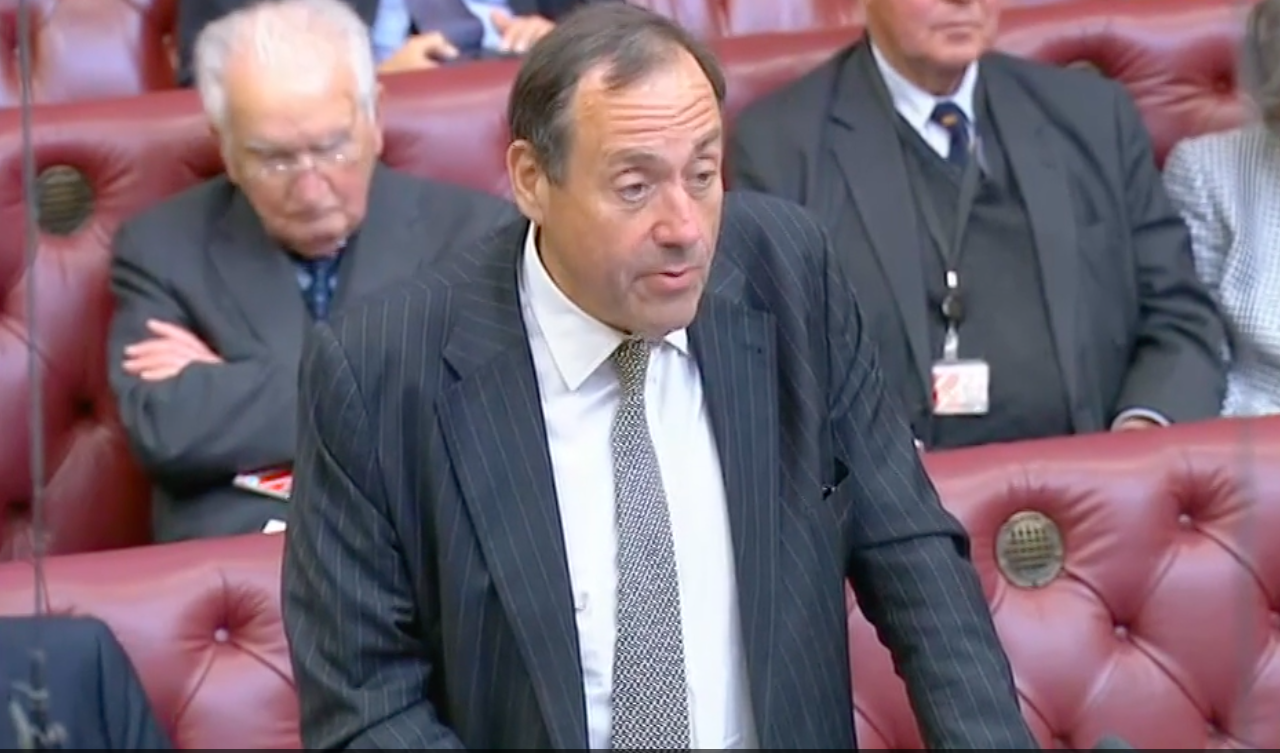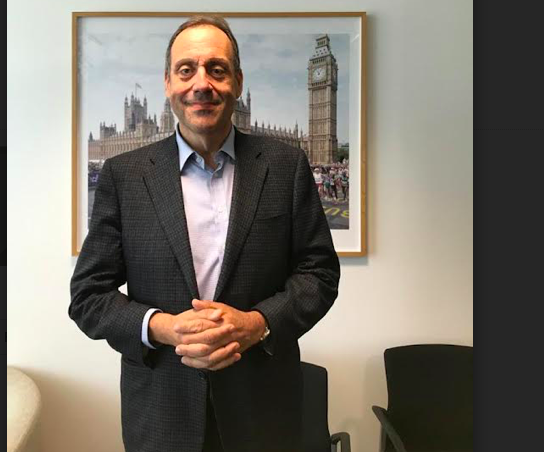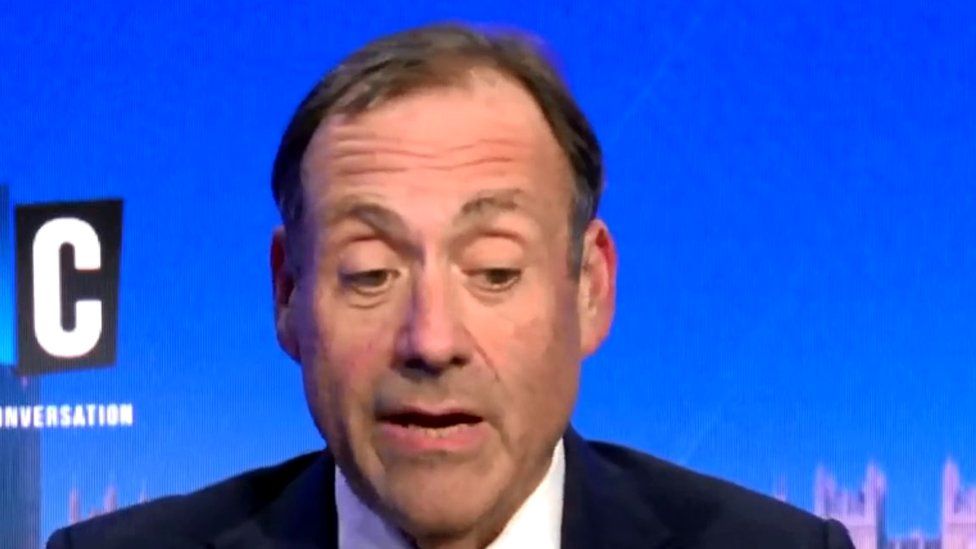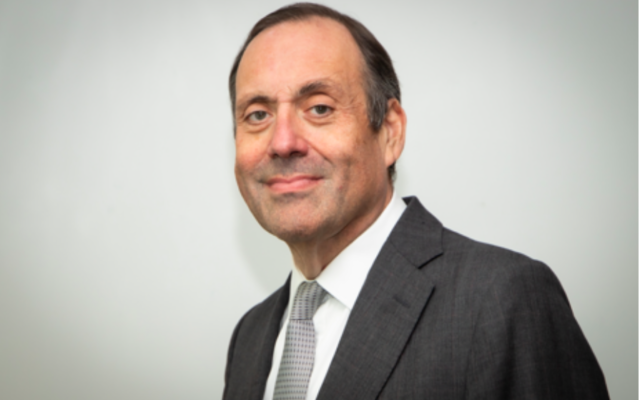Lord Harrington: It is ‘our destiny’ as Jews to help those fleeing persecution
Son of a market-trader from Leeds, the Ukrainian Refugees Minister tells of his determination to improve the UK government's response to the humanitarian crisis created by Putin's war
Lee Harpin is the Jewish News's political editor
The Minister for Ukrainian Refugees Lord Richard Harrington has spoken of his belief it is “our destiny” as Jewish people to strive to help those fleeing persecution and war.
In a revealing interview, the Leeds-born politician and businessman told of his overwhelming determination to succeed in his current role improving the UK government’s initially slow response to the refugee crisis created by Russia’s invasion of Ukraine.
Lord Harrington also paid tribute to David Cameron, recalling how the former Prime Minister had first made him Minister for Syrian Refugees in 2015, stressing to his long-time friend it was “a good job for a Jewish person to have.”
Come Cameron’s very last day in office, he would even call up Harrington from his constituency in Whitney to inform him he was with six Syrian families that day who had been resettled here as a result of his trusted minister’s work.
“I just thought that as a Jewish person – three of my grandparents are refugees,” Harrington said of the praise he received then from out-going PM.
“And if it wasn’t for this country, you wouldn’t be here now, and neither would I,” he
It was March this year when the Leeds-born son of market trader received a call from Levelling Up Secretary Michael Gove offering him the critical Ukraine job, which, despite being unpaid, handily came with a seat in the House of Lords.
Gove had probably recalled the fine job Harrington had done during the Syrian crisis, and with himself and Boris Johnson under immense pressure to improve the UK’s response to the displacement of millions of Ukrainians, he hoped he could repeat the feat.
Sitting in the spacious, yet unfussy workspace in the Home Office headquarters in Westminster, Harrington recalls responding to Gove’s job offer with a simple “Yes, absolutely.”
Besides offering him a route back into political life, he had stood down as the MP for Watford prior to the last general election, the Ukraine job again represented a more personal challenge for Harrington.
“I believe, for all of us Jewish people, it is like our destiny,” he says. “We were once there.”

Three months after starting the Ukraine refugee role, Harrington told the Lords last week that as of May 29th 65,700 people have successfully come to the UK from Ukraine.
There are still complaints, concerns, and criticisms about the government’s wider policy towards refugees, particularly over Priti Patel’s Rwanda asylum plan, which we agree beforehand not to discuss, because it is out of Harrington’s remit, and he had reportedly been warned not to go off message.
He did tell the Lords though of his wish to “reiterate that refugees from Ukraine are perfectly welcome to come here and there is absolutely no reason why they should be sent to Rwanda.”
But there is little doubt he and his team at the Home Office have made a difference to the response to the humanitarian crisis in Ukraine.
And it is easy to find political opponents willing to give Harrington credit for his efforts to improve the government’s response.
A Labour Lord, and Labour council leader both tell Jewish News of their respect for what Harrington is doing.
For a grasp of exactly where Harrington developed his determination to succeed from, it becomes apparent just how important the experience and advice of his father has been.
From his father’s market stall, where he proudly sold Harrington shirts, the minister recalled how his dad would frequently joke that Marks and Spencer had also begun their business on a stall in Leeds market.
“My problem was I stayed here,” was his father’s “standard joke”, Harrington reveals.
Harrington recalls his parents bringing their three children up, attending the local mainstream Reform Sinai Synagogue.
“My father had suffered quite a bit from antisemitism in the war, ” he says. “He believed in assimilation, which actually was quite strange. But he changed his mind in later life.”
Harrington, his brother, and his sister, all went on to marry Jews, with the peer recently marrying for a second time, again within the faith.
But he says after his barmitzvah “basically I didn’t go to shul” and when going to university, to read law, again, he says he “wasn’t bothered” with involvement with any Jewish groups.
“I’ve never been in denial,” says Harrington, “I’m proud of my heritage. But there was nothing in my life at the time.”
But what did register with Harrington, especially from watching his father at work was, he now says, a “thing of wanting to be self-employed and responsible for your own destiny.”
He reveals he went on to work on a market stall himself, selling costume jewellery in Camden for a spell, along with a stint as a minicab driver, having set up a business with two friends in which he was unable to draw a salary for a time.
But at Oxford University’s Keble College , Harrington’s interest in politics also flourished.
He was signed up by Damian Green, the MP and former minister, at Freshers Fair to become involved with the National Union of Students at executive level and the Federation of Conservative Students.
After graduating, Harrington would be offered a job at Conservative Party headquarters.
But his father intervened.
“Rather wisely he told me to stop messing about and told me it was time I got a proper job,” he recalls. “I joined John Lewis on a graduate scheme, thinking I could learn how the big boys did it.
“They were very nice people, but I felt as though I really had to try to make money, which would allow me to do other things in life.”

In 1983, he founded Harvington Properties, a property development company, with two friends from university and by 1990, Harrington became a shareholder and managing director of LSI Leisure Syndicates International a company active in the development, sales and management of holiday resorts in both the UK and Europe.
The company was sold to a listed American company at the end of the decade and is now owned by Hilton Hotels. Other notable work in property development included the restoration of one of Glasgow’s most famous hotels.
But the interest in politics remained, and by 1997, with Tony Blair’s Labour government now in power, Harrington, and his good friend Stuart Polak, now also a Lord, set about building up Conservative Friends of Israel as an organisation.
“I was the chairman, Stuart was the director, ” he recalls. “I was still in business, but I got to meet politicians by taking them to Israel.”
Harrington recalls taking Cameron to Israel in 2005, and during a visit to Yad Vashem he was deeply impressed by the leader’s response.
“I could see the emotion and the anguish on his face,” says Harrington of the day they visited Yad Vashem.
“I knew he was a good guy, basically he’s a good friend of Israel and the Jewish people.
“And to be fair, Boris Johnson is as well. Tony Blair was excellent, and so was Gordon Brown.”
With his reputation growing in 2008 Harrington was next asked to be Tory Party treasurer by Cameron, alongside Andrew Feldman and Howard Leigh.
Cameron wanted to “spread out” the party’s donor base, to stop the reliance on only a few wealthy individuals.
By chance, and a twist of fate, the opportunity for Harrington to potentially stand as a candidate in Watford for the Conservatives would arise ahead of the 2010 election.
It was a tricky seat to win, and many including Cameron and Stuart Polak, who wished Harrington “long life” when he told him he was standing, were less than enthusiastic about the decision.
Harrington says the clincher for him was the response of his own father, who was nearing the end of his life in Northwick Park Hospital at the time. ”
He recalls his father telling his son to stand for the Watford seat during a hospital visit, saying; “Don’t be a schmuck, you don’t want to look back when you are my age and think why didn’t I go for it? What have you got to lose?'”
Winning the seat in 2010, Harrington would then enjoy a nine year long stint as Watford MP and four years as Business and as Pensions Minister.
He fondly recalls Cameron phoning him at midnight from Balmoral, where he had been with the Queen, to offer him the Minister for Syrian Refugees role.
“Why me, David?,” he asked after the surprise offer of the new ministerial role.
“I think it’s a good job for a Jewish person,” explained Cameron, who stressed also that Harrington’s operational experience in business was also vital.

A year later in Bradford, as Harrington visited some of the 20, 000 Syrians who resettled here, he recalls a conversation with a professor of ancient languages, originally from Aleppo, but now working in Yorkshire.
He told the minister: “I want you to know, we were brought up thinking that you would kill our first-born and drink their blood. I want to thank you for what you’ve done for us. I realised what we were told was an absolute lie.”
Harrington recalls leaving the meeting in Bradford that day thinking :”David Cameron, you are a very smart man.”
Describing his political leanings as “centrish” by nature, there was also a series of now infamous clashes with Boris Johnson ahead of Harrington’s decision to stand down as an MP.
Unafraid to voice his opposition to the prospect of a No Deal Brexit, Johnson would eventually remove the parliamentary whip from Harrington, only to return it again to him a few weeks later.
But the prospect of doing another five year term as an MP, and the likelihood he would have to sit on the backbenches throughout, made Harrington decide to announce he was standing down in 2019.
He did so without regret or bitterness, and remained loyal to the Tories, even though he seemed out of step with the party’s more recent direction of travel.
On ringing Harrington to discuss the details of his current Ukraine role, Johnson’s first words to him were “welcome back.”
“There was never any animosity between myself and Boris,” he says, reassuringly.
On starting the role, Harrington admits his first instinct was to tell the PM to drop visas altogether, but then he saw the chaos in other countries who had adopted this path.
He said he also learned from the Syria crisis that refugees can “bring out the best in people, and also the worst.”
Harrington admits there have been issues with known abusers attempting to house refugees from Ukraine in this country.
“The worst of people are the pimps, the people traffickers and criminals. I realised we needed to keep the visas. It’s got to be done electronically,” he says.
Harrington says he is “proud” of the cross-governmental response to the Ukraine crisis.
There are still, he accepts, difficult cases, with young children without identifiable families.
The Ukrainian government is also reluctant to allow children to leave the country without proving who their parents were.
And police and other criminal checks in this country can delay matters further.
But his first call on taking the job, he reveals, was with the Word Jewish Relief charity, that have led the community’s response to the Ukraine crisis.
“I worked with them first on Syria,” he recalls.
“They are amazing people, they are here, there and everywhere.
“And with West London Synagogue, I’ve worked with them on this, and also with the Jewish Council For Racial Equality.
“I work with Labour MPs, Lib Dems, with anyone who wants to help refugees.”

Thank you for helping to make Jewish News the leading source of news and opinion for the UK Jewish community. Today we're asking for your invaluable help to continue putting our community first in everything we do.
For as little as £5 a month you can help sustain the vital work we do in celebrating and standing up for Jewish life in Britain.
Jewish News holds our community together and keeps us connected. Like a synagogue, it’s where people turn to feel part of something bigger. It also proudly shows the rest of Britain the vibrancy and rich culture of modern Jewish life.
You can make a quick and easy one-off or monthly contribution of £5, £10, £20 or any other sum you’re comfortable with.
100% of your donation will help us continue celebrating our community, in all its dynamic diversity...
Engaging
Being a community platform means so much more than producing a newspaper and website. One of our proudest roles is media partnering with our invaluable charities to amplify the outstanding work they do to help us all.
Celebrating
There’s no shortage of oys in the world but Jewish News takes every opportunity to celebrate the joys too, through projects like Night of Heroes, 40 Under 40 and other compelling countdowns that make the community kvell with pride.
Pioneering
In the first collaboration between media outlets from different faiths, Jewish News worked with British Muslim TV and Church Times to produce a list of young activists leading the way on interfaith understanding.
Campaigning
Royal Mail issued a stamp honouring Holocaust hero Sir Nicholas Winton after a Jewish News campaign attracted more than 100,000 backers. Jewish Newsalso produces special editions of the paper highlighting pressing issues including mental health and Holocaust remembrance.
Easy access
In an age when news is readily accessible, Jewish News provides high-quality content free online and offline, removing any financial barriers to connecting people.
Voice of our community to wider society
The Jewish News team regularly appears on TV, radio and on the pages of the national press to comment on stories about the Jewish community. Easy access to the paper on the streets of London also means Jewish News provides an invaluable window into the community for the country at large.
We hope you agree all this is worth preserving.






















